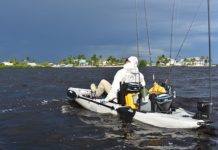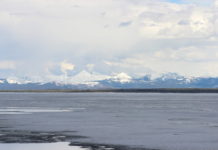A troublesome divide has been growing more and more apparent in the fly fishing sphere. This shift may well stem from the unprecedented craziness we’ve all dealt with over the last year and a half. It might also spring, at least in part, from the increase in the number of fly fishers who have no experience with a spinning rod or a bait-casting rig, or the fact that so many of us engage on social media, or our burgeoning focus on species other than trout. Whatever the case, it sure seems as if a lot of anglers are wading off in opposing directions.
Let’s start at the beginning. The largest divide in our sport rests squarely on the letter Q. On one side are folks who concentrate on the quality of the experience. Whether they focus on the challenge of fly fishing, or the healing power of nature, or the intrinsic joy of good fly casting, or the beauty of the great outdoors, or the adventure of wilderness fly fishing, or the excitement of watching a big Henry’s Fork rainbow rise to the surface — or something else entirely — doesn’t really matter. While these folks may experience the world through different lenses, and aspire towards different goals, they understand that fly fishing provides something truly special; something that’s hard to find with other angling methods and other types of tackle.
Whatever their personal differences, they’re united in their search for a quality experience. I’ve mentioned the “qualitative” branch of fly fishing in the past, and noted that I count myself among its many adherents.
On the other side of the “Q” divide — the other side of the coin, if you will — are anglers who emphasize quantity. As in numbers and size. People who walk the quantitative path have decided, sometimes consciously and sometimes not, that the clarity of quantitative analysis makes everything simpler, easier and more enjoyable. As a consequence, “more” and “bigger” are always better. That’s an immutable truth on the quantitative side, as is the belief that the game isn’t worth playing if we don’t keep score.
As a life-long sports fan, where statistics are vital and we measure our heroes with batting averages and points-per-game and touchdown passes thrown, I certainly understand the allure of numbers. That said, I should probably point out the obvious. The quantitative crowd is putting itself at a severe disadvantage when it comes to fly fishing.
Think of it like this. Anyone who hopes to maximize the size of their fish, or the numbers that they catch, diminishes their odds by choosing fly tackle. Skilled anglers will almost always catch more trout (or tarpon, or permit, or bass, or pike, or salmon) with gear or bait, and they’ll have an easier time of it as well.
In fact, the one time when fly fishing improves our odds — the only one I can think of — is when we fish for rising trout. A fly rod with a floating fly line is the most effective way to present small or medium-sized dry flies to trout feeding on the surface. Outside of that one narrow niche, though, our angling is easier and more productive if we opt for bait or lures. So why would someone fixated on catching more fish, or bigger fish, or more and bigger fish, consciously choose to handicap themselves with a fly rod? That’s a tough one for me to understand.
I’m also curious why so many folks who focus on fish size or numbers dismiss the importance of the overall angling experience. Why not simply accept that others have different priorities? And why the ever-increasing acrimony towards people who focus on quality rather than quantity?
As fly fishing continues to shift further into the mainstream of American life, it feels as if we’re losing certain core values that have long set our sport apart from other forms of angling. I wish it were otherwise but I’m seeing this shift in perception and behavior on an almost daily basis — both in conversations with other fishermen and in online fly fishing forums. Rather than simply accepting the current trend as inevitable, though, I’ll share a couple of relevant points.
The first is that we are individuals and it’s okay to view the world through our own unique lens. There’s no rule that says we all have to experience fly fishing in the same way or conform to someone else’s expectations.
The second is that it’s okay for fly fishing, and fly casting, to be forms of self-expression. In fact, I’ll go even further and state that our fishing and our casting should reflect our personalities and our idiosyncrasies.
The third is that there’s really only one reason to fish with a fly rod — and that’s to have fun. Which, when you think about it, requires a little introspection. If we want to walk away happy, then we need to know which paths, of the myriad available to us, lead directly to enjoyment.
If that last statement needs further translation, just keep in mind that there are a ton of options at our fingertips. We can focus on the joy inherent in good fly casting, or on the beauty and serenity of nature. We can search for rising rainbows or difficult-to-find species like permit or musky. We can opt for simplicity or complexity; solitude or companionship; home waters or exotic destinations; rivers or lakes; fresh water or salt; dry flies, nymphs, streamers or wet flies; surface or sub-surface; tight line or slack; little fish or big; more or fewer.
The options are, if not endless, then certainly vast. At the same time, our ultimate success depends on our ability to chart a course towards whatever form of angling is most likely to make us smile. As Socrates once said, “to know thyself is the beginning of wisdom.” Or to quote a more recent sage — Lucille Ball — “it’s a helluva start, being able to recognize what makes you happy.”
Credit: Source link






























